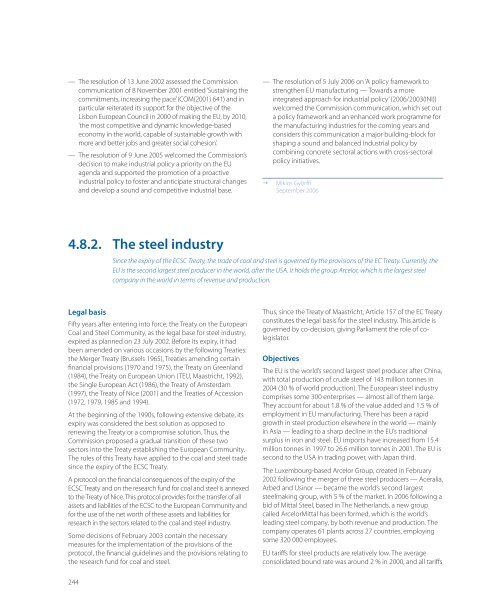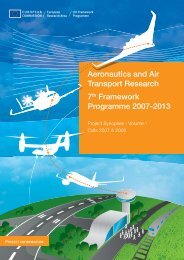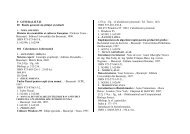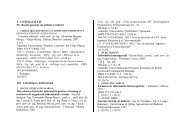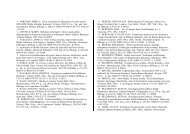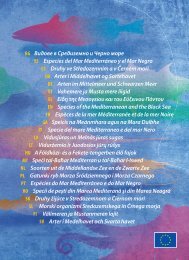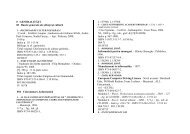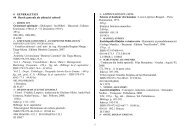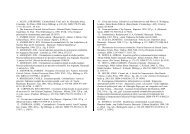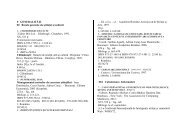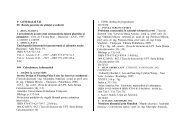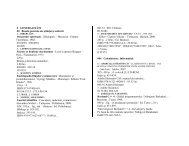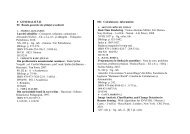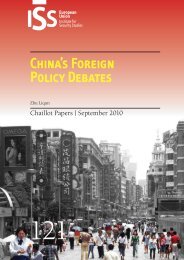Fact Sheets on the European Union â 2 - EU Bookshop - Europa
Fact Sheets on the European Union â 2 - EU Bookshop - Europa
Fact Sheets on the European Union â 2 - EU Bookshop - Europa
Create successful ePaper yourself
Turn your PDF publications into a flip-book with our unique Google optimized e-Paper software.
— The resoluti<strong>on</strong> of 13 June 2002 assessed <strong>the</strong> Commissi<strong>on</strong><br />
communicati<strong>on</strong> of 8 November 2001 entitled ‘Sustaining <strong>the</strong><br />
commitments, increasing <strong>the</strong> pace’ (COM(2001) 641) and in<br />
particular reiterated its support for <strong>the</strong> objective of <strong>the</strong><br />
Lisb<strong>on</strong> <strong>European</strong> Council in 2000 of making <strong>the</strong> <strong>EU</strong>, by 2010,<br />
‘<strong>the</strong> most competitive and dynamic knowledge-based<br />
ec<strong>on</strong>omy in <strong>the</strong> world, capable of sustainable growth with<br />
more and better jobs and greater social cohesi<strong>on</strong>’.<br />
— The resoluti<strong>on</strong> of 9 June 2005 welcomed <strong>the</strong> Commissi<strong>on</strong>’s<br />
decisi<strong>on</strong> to make industrial policy a priority <strong>on</strong> <strong>the</strong> <strong>EU</strong><br />
agenda and supported <strong>the</strong> promoti<strong>on</strong> of a proactive<br />
industrial policy to foster and anticipate structural changes<br />
and develop a sound and competitive industrial base.<br />
— The resoluti<strong>on</strong> of 5 July 2006 <strong>on</strong> ‘A policy framework to<br />
streng<strong>the</strong>n <strong>EU</strong> manufacturing — Towards a more<br />
integrated approach for industrial policy’ (2006/2003(INI))<br />
welcomed <strong>the</strong> Commissi<strong>on</strong> communicati<strong>on</strong>, which set out<br />
a policy framework and an enhanced work programme for<br />
<strong>the</strong> manufacturing industries for <strong>the</strong> coming years and<br />
c<strong>on</strong>siders this communicati<strong>on</strong> a major building-block for<br />
shaping a sound and balanced industrial policy by<br />
combining c<strong>on</strong>crete sectoral acti<strong>on</strong>s with cross-sectoral<br />
policy initiatives.<br />
g<br />
Miklos Györffi<br />
September 2006<br />
4.8.2. The steel industry<br />
Since <strong>the</strong> expiry of <strong>the</strong> ECSC Treaty, <strong>the</strong> trade of coal and steel is governed by <strong>the</strong> provisi<strong>on</strong>s of <strong>the</strong> EC Treaty. Currently, <strong>the</strong><br />
<strong>EU</strong> is <strong>the</strong> sec<strong>on</strong>d largest steel producer in <strong>the</strong> world, after <strong>the</strong> USA. It holds <strong>the</strong> group Arcelor, which is <strong>the</strong> largest steel<br />
company in <strong>the</strong> world in terms of revenue and producti<strong>on</strong>.<br />
Legal basis<br />
Fifty years after entering into force, <strong>the</strong> Treaty <strong>on</strong> <strong>the</strong> <strong>European</strong><br />
Coal and Steel Community, as <strong>the</strong> legal base for steel industry,<br />
expired as planned <strong>on</strong> 23 July 2002. Before its expiry, it had<br />
been amended <strong>on</strong> various occasi<strong>on</strong>s by <strong>the</strong> following Treaties:<br />
<strong>the</strong> Merger Treaty (Brussels 1965), Treaties amending certain<br />
financial provisi<strong>on</strong>s (1970 and 1975), <strong>the</strong> Treaty <strong>on</strong> Greenland<br />
(1984), <strong>the</strong> Treaty <strong>on</strong> <strong>European</strong> Uni<strong>on</strong> (T<strong>EU</strong>, Maastricht, 1992),<br />
<strong>the</strong> Single <strong>European</strong> Act (1986), <strong>the</strong> Treaty of Amsterdam<br />
(1997), <strong>the</strong> Treaty of Nice (2001) and <strong>the</strong> Treaties of Accessi<strong>on</strong><br />
(1972, 1979, 1985 and 1994).<br />
At <strong>the</strong> beginning of <strong>the</strong> 1990s, following extensive debate, its<br />
expiry was c<strong>on</strong>sidered <strong>the</strong> best soluti<strong>on</strong> as opposed to<br />
renewing <strong>the</strong> Treaty or a compromise soluti<strong>on</strong>. Thus, <strong>the</strong><br />
Commissi<strong>on</strong> proposed a gradual transiti<strong>on</strong> of <strong>the</strong>se two<br />
sectors into <strong>the</strong> Treaty establishing <strong>the</strong> <strong>European</strong> Community.<br />
The rules of this Treaty have applied to <strong>the</strong> coal and steel trade<br />
since <strong>the</strong> expiry of <strong>the</strong> ECSC Treaty.<br />
A protocol <strong>on</strong> <strong>the</strong> financial c<strong>on</strong>sequences of <strong>the</strong> expiry of <strong>the</strong><br />
ECSC Treaty and <strong>on</strong> <strong>the</strong> research fund for coal and steel is annexed<br />
to <strong>the</strong> Treaty of Nice. This protocol provides for <strong>the</strong> transfer of all<br />
assets and liabilities of <strong>the</strong> ECSC to <strong>the</strong> <strong>European</strong> Community and<br />
for <strong>the</strong> use of <strong>the</strong> net worth of <strong>the</strong>se assets and liabilities for<br />
research in <strong>the</strong> sectors related to <strong>the</strong> coal and steel industry.<br />
Some decisi<strong>on</strong>s of February 2003 c<strong>on</strong>tain <strong>the</strong> necessary<br />
measures for <strong>the</strong> implementati<strong>on</strong> of <strong>the</strong> provisi<strong>on</strong>s of <strong>the</strong><br />
protocol, <strong>the</strong> financial guidelines and <strong>the</strong> provisi<strong>on</strong>s relating to<br />
<strong>the</strong> research fund for coal and steel.<br />
Thus, since <strong>the</strong> Treaty of Maastricht, Article 157 of <strong>the</strong> EC Treaty<br />
c<strong>on</strong>stitutes <strong>the</strong> legal basis for <strong>the</strong> steel industry. This article is<br />
governed by co-decisi<strong>on</strong>, giving Parliament <strong>the</strong> role of colegislator.<br />
Objectives<br />
The <strong>EU</strong> is <strong>the</strong> world’s sec<strong>on</strong>d largest steel producer after China,<br />
with total producti<strong>on</strong> of crude steel of 143 milli<strong>on</strong> t<strong>on</strong>nes in<br />
2004 (30 % of world producti<strong>on</strong>). The <strong>European</strong> steel industry<br />
comprises some 300 enterprises — almost all of <strong>the</strong>m large.<br />
They account for about 1.8 % of <strong>the</strong> value added and 1.5 % of<br />
employment in <strong>EU</strong> manufacturing. There has been a rapid<br />
growth in steel producti<strong>on</strong> elsewhere in <strong>the</strong> world — mainly<br />
in Asia — leading to a sharp decline in <strong>the</strong> <strong>EU</strong>’s traditi<strong>on</strong>al<br />
surplus in ir<strong>on</strong> and steel. <strong>EU</strong> imports have increased from 15.4<br />
milli<strong>on</strong> t<strong>on</strong>nes in 1997 to 26.6 milli<strong>on</strong> t<strong>on</strong>nes in 2001. The <strong>EU</strong> is<br />
sec<strong>on</strong>d to <strong>the</strong> USA in trading power, with Japan third.<br />
The Luxembourg-based Arcelor Group, created in February<br />
2002 following <strong>the</strong> merger of three steel producers — Aceralia,<br />
Arbed and Usinor — became <strong>the</strong> world’s sec<strong>on</strong>d largest<br />
steelmaking group, with 5 % of <strong>the</strong> market. In 2006 following a<br />
bid of Mittal Steel, based in The Ne<strong>the</strong>rlands, a new group<br />
called ArcelorMittal has been formed, which is <strong>the</strong> world’s<br />
leading steel company, by both revenue and producti<strong>on</strong>. The<br />
company operates 61 plants across 27 countries, employing<br />
some 320 000 employees.<br />
<strong>EU</strong> tariffs for steel products are relatively low. The average<br />
c<strong>on</strong>solidated bound rate was around 2 % in 2000, and all tariffs<br />
244


